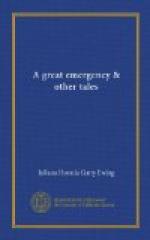The code of honour was to forbid a lot of things that had been very common in the school. Lying, cheating over bargains, telling tales, bragging, bad language, and what the code called “conduct unbecoming schoolfellows and gentlemen.” There were a lot of rules in it, too, about clean nails, and shirts, and collars and socks, and things of that sort. If any boy refused to agree to it, he had to fight with Thomas Johnson.
There could not have been a better person than Rupert to make a code of honour. We have always been taught that honour was the watch-word of our family—dearer than anything that could be gained or lost, very much dearer than mere life. The motto of our arms came from an ancestor who lost the favour of the King by refusing to do something against his conscience for which he would have been rewarded. It is “Honour before honours.”
I can just remember the man, with iron-grey hair and gold spectacles, who came to our house after my father’s death. I think he was a lawyer. He took lots of snuff, so that Henrietta sneezed when he kissed her, which made her very angry. He put Rupert and me in front of him, to see which of us was most like my father, and I can recall the big pinch of snuff he took, and the sound of his voice saying “Be like your father, boys! He was as good as he was gallant. And there never lived a more honourable gentleman.”
Every one said the same. We were very proud of it, and always boasted about our father to the new nursemaids, or any other suitable hearer. I was a good deal annoyed by one little maid, who when I told her, over our nursery tea, that my father had been the most honourable of men, began to cry about her father, who was dead too, and said he was “just the same; for in the one and twenty years he kept a public-house, he never put so much as a pinch of salt into the beer, nor even a gill of water, unless it was in the evening at fair-time, when the only way to keep the men from fighting was to give them their liquor so that it could not do them much harm.” I was very much offended by the comparison of my father, who was an officer and a gentleman of rank, with her father, who was a village publican; but I should like to say, that I think now that I was wrong and Jane was right. If her father gave up profit for principle, he was like my father, and like the ancestor we get the motto from, and like every other honourable man, of any rank or any trade.
Every time I boasted in the nursery of my father being so honourable, I always finished my saying, that that was why he had the word Honourable before his name, as men in old times used to be called “the Good” or “the Lion Heart.” The nursemaids quite believed it, and I believed it myself, till the first week I went to school.
It makes me hot all over to remember what I suffered that week, and for long, afterwards. But I think it cured me of bragging, which is a mean ungentlemanly habit, and of telling everybody everything about myself and my relations, which is very weak-minded.




